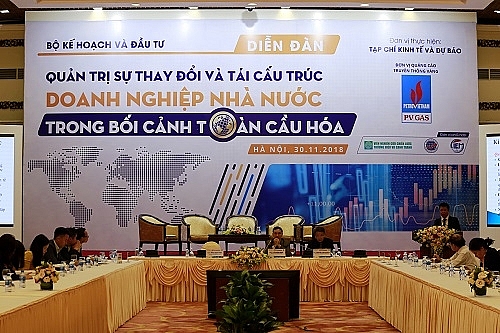Equitisation changes too little in SOEs
 |
| The workshop on the administration and restructuring of SOEs held by the Ministry of Planning and Investment |
According to statistics, during 2011-2018 as many as 600 state-owned enterprises (SOEs) have been equitised, enabling the state to obtain around VND200 trillion ($8.7 billion). However, according to economists, there are a great number of shortcomings in the governance of these corporations after equitisation.
In fact, there are some issues rooted in state ownership and state management, which result in little change in the nature and performance of equitised SOEs.
At the workshop on the administration and restructuring of SOEs in the context of globalisation, Nguyen Dai Lai, banking and financial expert, said that 90 per cent of SOEs have already been equitised. Particularly in the banking sector, only Vietnam Bank for Social Policies and Vietnam Bank for Agriculture and Rural Development (Agriank) remain unequitised.
However, in fact, the equitised banks are still state-owned banks as the equitisations did call for more capital, but not much changed in corporate governance because the state still holds up to 90 per cent of the total capital, the expert said.
Nguyen Dai Lai said that the state should completely give up its holdings or retain only a small minority portion while staying out of governance.
Expressing his agreement, Vu Dinh Anh, economic expert, said that the process of SOE restructuring has lasted for over 20 years, but the results remain poor. “Now we have to discuss how to manage these SOEs, especially equitised SOEs where the state still holds more than 50 per cent or even 90 per cent of the stakes,” Anh said.
Thereby, it is very difficult to apply transparent and modern governance methods at these firms. Two examples of poor management and going against market mechanisms are Vietnam Mobile Telecom Services One Member Limited Liability Company (MobiFone) forking out nearly VND9 trillion ($387 million) to acquire AVG and the ongoing argument between Vietnam Electricity Corporation (EVN) and Vietnam National Coal-Mineral Industries Holding Corporation Limited (Vinacomin) on payment method and coal price.
Talking about the roots of this problem, Tran Dinh Thien, former director general of the Institute of Economics, said that SOEs changed very little after equitisation. They received a new name, but the state retained a dominant shareholding and there were limited changes to leadership. Oftentimes their performance was even worse than before as self-interest came to the fore and there was more space for illegal activities.
Thien said that equitisation should be replaced by privatisation. Equitised companies should be under the management of real entrepreneurs and take on a sleeker, more modern form to stay afloat amidst free market rules.
Additionally, according to Nguyen Van Khach, vice chairman of the National Financial Supervisory Commissio, an SOE governance system in line with international practices (such as the OECD - Organisation for Economic Co-operation and Development standards) should be built for equitised firms and all SOEs in general.
At the same time, it is necessary to improve transparency and supervision over SOEs. The state should also publicise its capital in SOEs, the performance of these SOEs, and the efficiency of the state’s investment. The supervision and evaluation of SOEs should be governed by legal documents, and criteria for supervision and evaluation of the efficiency of state investment, financial risks, and corporate governance should be built.
What the stars mean:
★ Poor ★ ★ Promising ★★★ Good ★★★★ Very good ★★★★★ Exceptional
Related Contents
Latest News
More News
- A golden time to shine within ASEAN (February 19, 2026 | 20:22)
- Vietnam’s pivotal year for advancing sustainability (February 19, 2026 | 08:44)
- Strengthening the core role of industry and trade (February 19, 2026 | 08:35)
- Future orientations for healthcare improvements (February 19, 2026 | 08:29)
- Infrastructure orientations suitable for a new chapter (February 19, 2026 | 08:15)
- Innovation breakthroughs that can elevate the nation (February 19, 2026 | 08:08)
- ABB Robotics hosts SOMA Value Provider Conference in Vietnam (February 19, 2026 | 08:00)
- Entire financial sector steps firmly into a new spring (February 17, 2026 | 13:40)
- Digital security fundamental for better and faster decision-making (February 13, 2026 | 10:50)
- Aircraft makers urge out-the-box thinking (February 13, 2026 | 10:39)

 Tag:
Tag:
























 Mobile Version
Mobile Version